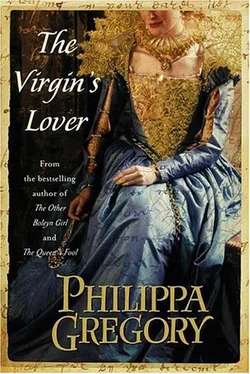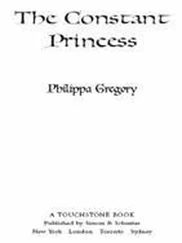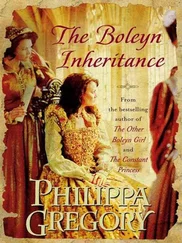Aloud he said: “I would do it, but I would need an undertaking from Your Majesty.”
Elizabeth looked up at him; he thought he had never seen her so drawn and tired, not even in her girlhood when she had faced death. “What do you want, Spirit?”
“That you promise me that you will be faithful to our long friendship while I am so far from you,” he said steadily. “And that you will undertake no great decision, no alliance, no treaty”—he did not dare even to glance toward Dudley—“no partnership until I come home again.”
She, at least, was innocent of any plot against him. She answered him quickly and honestly. “Of course. And you will try to bring us to peace, won’t you Spirit?”
Cecil bowed. “I will do my very best for you and for England,” he said.
She stretched out her hand for him to kiss. The fingernails were all ragged where she had been picking at them, when he kissed her fingers he felt the torn cuticles prickle his lips. “God bring Your Grace to peace of mind,” he said gently. “I will serve you in Newcastle as I would serve you here. Do you keep faith with me too.”
Cecil’s horses and great train of soldiers, servants, and guards were drawn up before the doors of the palace, the queen herself and the court arrayed to see him off. It was as if she were signaling to him, and to everyone else who would take careful note, that he was not being bundled north to get him out of the way, but being sent off in state and would be badly missed.
He knelt before her on the stone step. “I wanted to speak to you before I left,” he said, his voice very low. “When I came to your presence chamber last night they said you had retired and I could not see you.”
“I was tired,” she said evasively.
“It is about the coinage. And it is important.”
She nodded and he rose to his feet, gave her his arm, and they walked down the palace steps together, out of earshot of his waiting train. “We need to revalue the coin of the realm,” Cecil said quietly. “But it has to be done in utter secret or every beldame in the land will be trading coins away, knowing that they will be no good at the new value.”
“I thought we could never afford it,” Elizabeth said.
“We can’t afford not to do it,” Cecil said. “It has to be done. And I have found a way to borrow gold. We will mint new coins and in one move, overnight, call in the old, weigh them, and replace them with new.”
She did not understand at first. “But people with stocks of coins will not have the fortune they thought they had.”
“Yes,” Cecil said. “It will hurt the people with treasuries, but not the common people. The people with treasuries will squeak but the common people will love us. And the people with treasuries are also merchants and sheep farmers and venturers, they will get good value for the new coins when they trade abroad. They won’t squeak too loud.”
“What about the royal treasury?” she asked, alert at once to her own diminished fortune.
“Your councillor Armagil Waad is dealing with it,” he said. “You have been converting to gold since you came to the throne. We will make the coinage of this country solid once more, and they will call this a golden age.”
Elizabeth smiled at that, as he knew she would.
“But it has to be an utter secret,” he said. “If you tell one person,” and we both know which person it would be “then he would speculate in coins and it would alert everyone who watches him. All his friends would speculate too, they would copy him, even if he did not warn them, and his rivals would want to know why and speculate also. This has to be an utter secret or we cannot do it.”
She nodded.
“If you tell him you will be ruined.”
She did not glance back up the steps at Dudley; she kept her eyes fixed on Cecil.
“Can you keep such a secret?” he asked.
Her dark Boleyn eyes gleamed up at him with all the bright cynicism of her merchant forebears. “Oh, Spirit, you of all people know that I can.”
He bowed, kissed her hand, and turned to mount his horse. “When shall we do it?” she asked him.
“September,” he said. “This year. Pray God we have peace then as well.”
Summer 1560
IT TOOK CECIL and his entourage a week to reach Newcastle from London, riding most of the way on the Great North Road though fine early summer weather. He spent one night at Burghley, his new, beautiful half-built palace. His wife, Mildred, greeted him with her usual steady good humor, and his two children were well.
“Do we have much coin?” he asked her over dinner.
“No,” she said. “When the queen came to the throne you told me that we should not save coin and since then it’s easy to see that matters have got even worse. I keep as little as possible. I take rent in kind or in goods wherever I can, the coin is so bad.”
“That’s good,” he said. He knew that he need say no more. Mildred might live in a remote area but there was not much happening in the country and in the city that she did not know of. Her kin were the greatest Protestants in the land; she came from the formidably intelligent Protestant Cheke family, and constant letters of news, opinion, and theology passed from one great house to another.
“Is everything well here?” he asked. “I would give a king’s ransom to stay and see the builders.”
“Would it cost a royal ransom for you to be late in Scotland?” she asked shrewdly.
“Yes,” he said. “I am on grave business, wife.”
“Will we win?” she asked bluntly.
Cecil paused before replying. “I wish I could be sure,” he said. “But there are too many players and I cannot know the cards they hold. We have good men on the border now; Lord Grey is reliable and Thomas Howard is as fiery as ever. But the Protestant lords are a mixed bunch and John Knox is a liability.”
“A man of God,” she said sharply.
“Certainly he acts as if divinely inspired,” he said mischieviously, and saw her smile.
“You have to stop the French?”
“Or we are lost,” he concurred. “I’d take any ally.”
Mildred poured him a glass of wine and said no more. “It’s good to have you here,” she remarked. “When all this is over perhaps you can come home?”
“Perhaps,” he said. “Hers is not a light service.”
The next morning, Cecil had broken his fast and was ready to leave at dawn. His wife was up to see him off.
“You take care in Scotland,” she said as she kissed him farewell. “I know that there are Protestant rogues as well as Papist ones.”
They made good time to Newcastle, arriving in the first week in June, and Cecil found Thomas Howard in good spirits, confident of the strength of the border castles, and determined that there should be no peace negotiations to cede what a battle might win.
“We are here with an army,” he complained to Cecil. “Why would we bring an army if we are just going to make peace?”
“She thinks that Leith will never fall,” Cecil said shrewdly. “She thinks this is a battle that the French will win.”
“We can defeat them!” Norfolk exclaimed. “We can defeat them and then open negotiations for peace. They can ask us for terms when they are beaten.”
Cecil settled down to the long process of negotiating with the French commissioner for peace, Monsieur Randan. At once Thomas Howard drew Cecil to one side to object to the French entourage.
“Cecil, half the so-called courtiers in his train are engineers,” he said. “I don’t want them looking over our dispositions and checking out the walls of the castle here and at Edinburgh. If you give them free rein they will see everything I have done here. The other half are spies. As they travel to Edinburgh and Leith, they will meet with their agents and their news will go straight back to France. Randan has to negotiate on his own word; he can’t go galloping up to the queen regent at Leith and back every other day, seeing God knows what and talking to God knows who.”
Читать дальше
Конец ознакомительного отрывка
Купить книгу












